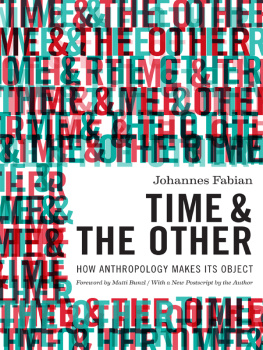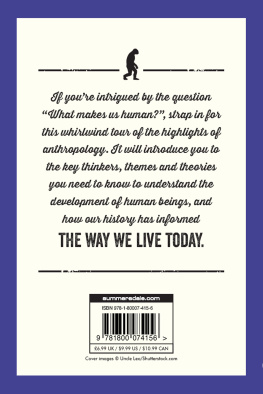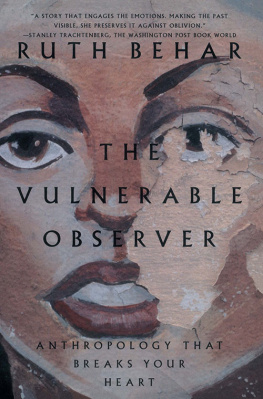Time and the Other
Time and the Other
HOW ANTHROPOLOGY MAKES ITS OBJECT
Johannes Fabian
COLUMBIA UNIVERSITY PRESS NEW YORK
Columbia University Press
Publishers Since 1893
New York Chichester, West Sussex
cup.columbia.edu
Copyright 2014, 2002, 1983 Columbia University Press
Postscript 2006 Sage Publications
All rights reserved
E-ISBN 978-0-231-53748-3
Fabian, Johannes.
Time and the other : how anthropology makes its object / Johannes Fabian
p. cm.
Includes bibliographical references and index.
ISBN 978-0-231-16926-4 (cloth : alk. paper) ISBN 978-0-231-16927-1 (pbk. : alk. paper) ISBN 978-0-231-53748-3 (e-book)
Library of Congress Control Number : 2013953081
A Columbia University Press E-book.
CUP would be pleased to hear about your reading experience with this e-book at .
Cover design by Anna Fabian
Contents
FIRST PUBLISHED IN 1983, Johannes Fabians Time and the Other ranks among the most widely cited books of a critical anthropology that has, in the course of the past two decades, gradually moved into the center of the discipline. But like other canonical texts written in this tradition (cf. Clifford and Marcus 1986; Marcus and Fischer 1986; Clifford 1988; Rosaldo 1989), Time and the Other continues to hold theoretical relevance, retaining the radical flavor of an urgent polemic. Praised by many as a path-breaking critique of the anthropological project, while met with apprehension by others in light of its uncompromising epistemological stance, it has become a fixture in the theoretical landscape of contemporary anthropology. The following introduction leads from an exposition of the books argument and an analysis of its relation to Fabians earlier writings to its contextualization in the critical anthropology of the 1970s and early 1980s. The piece concludes with a brief overview of anthropological developments in the wake of the initial publication of Time and the Other.
The Argument
Time and the Other is a historical account of the constitutive function of time in Anglo-American and French anthropology. In contrast to prominent ethnographic accounts of culturally determined temporal systems (cf. Evans-Pritchard 1940; Bourdieu 1977), Fabians critical project operates on a conceptual level, interrogating and problematizing the deployment and uses of time as such. In this sense, Time and the Other functions both as a meta-analysis of the anthropological project at large and as a deconstruction of its enabling temporal formations.
Fabians argument is motivated by a contradiction inherent to the anthropological discipline: on the one hand, anthropological knowledge is produced in the course of fieldwork through the intersubjective communication between anthropologists and interlocutors; on the other hand, traditional forms of ethnographic representation require the constitutive suppression of the dialogical realities generating anthropological insights in the first place. In the objectifying discourses of a scientistic anthropology, Others thus never appear as immediate partners in a cultural exchange but as spatially and, more importantly, temporally distanced groups. Fabian terms this discrepancy between the intersubjective realm of fieldwork and the diachronic relegation of the Other in anthropological texts the schizogenic use of Time, and he explicates in the following manner:
I believe it can be shown that the anthropologist in the field often employs conceptions of Time quite different from those that inform reports on his findings. Furthermore, I will argue that a critical analysis of the role Time is allowed to play as a condition for producing ethnographic knowledge in the practice of fieldwork may serve as a starting point for a critique of anthropological discourse in general. (21)
a term that becomes the gloss for a situation where the Others hierachically distancing localization suppresses the simultaneity and contemporaneity of the ethnographic encounter. The temporal structures so consituted thus place anthropologists and their readers in a privileged time frame, while banishing the Other to a stage of lesser development. This situation is ultimately exemplified by the deployment of such essentially temporal categories as primitive to establish and demarcate anthropologys traditional object.
Fabian terms such denial of coevalness the allochronism of anthropology (32). At once the product of an entrenched ethnocentrism and the enabling ideology of traditional discourses about the Other, anthropologys allochronic orientation emerges as the disciplines central problematic. Fabians project in Time and the Other follows from this premise, fusing a critical genealogy of allochronic discourse in anthropology with a polemic against its unreflected reproduction.
Fabian presents his critique of allochronism in the context of a comprehensive analysis of the function of temporal systems in Western scientific discourses. In the first chapter of Time and the Other, he traces the transformation of time from the initial secularization of the Judeo-Christian notion of history during the Renaissance to its revolutionary naturalization in the course of the nineteenth century. Anthropologys establishment as an autonomous discipline in the second half of the nineteenth century was predicated on this transformation. The disciplines evolutionary doctrineconstituted at the intersection of scientism, Enlightenment belief in progress, and colonially veiled ethnocentrismin turn codified anthropologys allochronic orientation. In this manner, contemporary scientific categorizations like savage, barbaric, and civilized signified stages of historical development. Conceiving global history in terms of universal progress, this allochronic logic identified and constituted late-nineteenth-century savages as survivalsinhabitants of more or less ancient states of cultural development. At the same time, anthropologys allochronism established a civilized West as the pinnacle of universal human progress, an argument that helped to legitimize various imperialist projects.
Fabian views anthropologys foundational allochronism as an ongoing problem. For the onset of antievolutionary paradigms in twentieth-century anthropology notwithstanding, he regards the relegation of the ethnographic object to another time as the constitutive element of the anthropological project at large. Fabian substantiates this thesis in by a similar examination of symbolic anthropology), Fabian identifies the denial of coevalness and ethnographic intersubjectivity as constitutive elements of an anthropology that authorizes itself through the creation of global temporal hierarchies.
These deconstructive readings are corroborated in by Fabians acute analyses of the strategic forms of representation and the epistemological foundations of allochronic discourse. In regard to the representation of the Other, Fabian identifies the ethnographic present (the practice of giving accounts of other cultures and societies in the present tense [80]) and the textually enforced elimination of the anthropologists autobiographical voice as allochronisms central rhetorical figures. As Fabian shows, the ethnographic present indexes a dialogic realitya reality, however, that is only realized in the communicative interaction between the anthropologist and his readers. The anthropological object remains excluded from this dialogue, despite its constitution at the intersubjective moment of fieldwork. In this context, Fabian identifies the ethnographic present as a rhetorical vehicle that reifies the Other as the inherently deindividuated object of the anthropologists observation.






